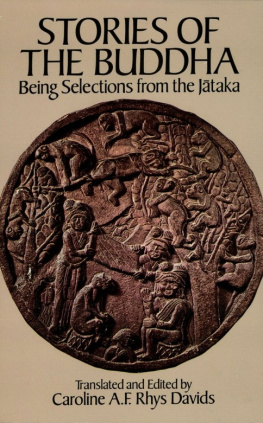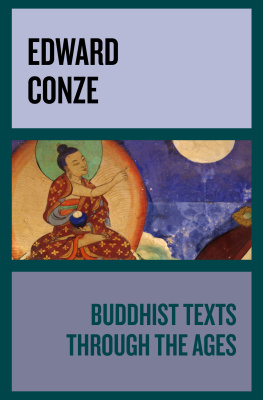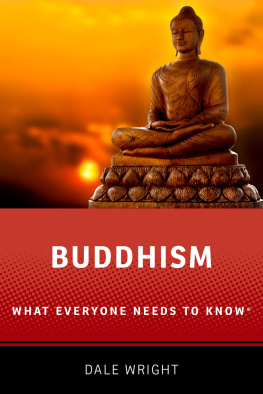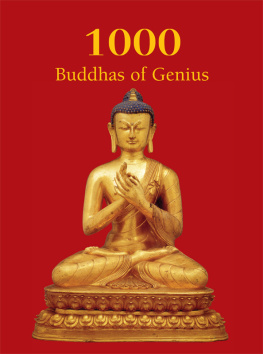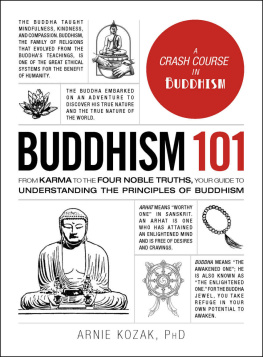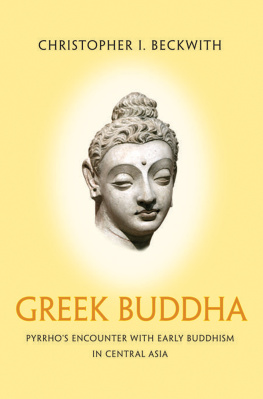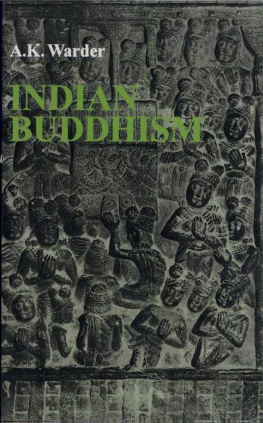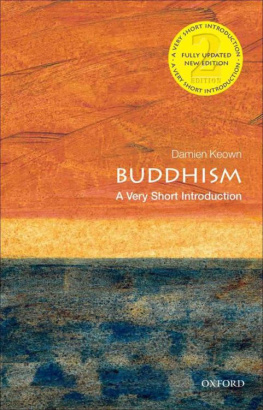T. W. Rhys Davids - Early Buddhism
Here you can read online T. W. Rhys Davids - Early Buddhism full text of the book (entire story) in english for free. Download pdf and epub, get meaning, cover and reviews about this ebook. year: 2011, publisher: Barnes & Noble, genre: Religion. Description of the work, (preface) as well as reviews are available. Best literature library LitArk.com created for fans of good reading and offers a wide selection of genres:
Romance novel
Science fiction
Adventure
Detective
Science
History
Home and family
Prose
Art
Politics
Computer
Non-fiction
Religion
Business
Children
Humor
Choose a favorite category and find really read worthwhile books. Enjoy immersion in the world of imagination, feel the emotions of the characters or learn something new for yourself, make an fascinating discovery.
- Book:Early Buddhism
- Author:
- Publisher:Barnes & Noble
- Genre:
- Year:2011
- Rating:4 / 5
- Favourites:Add to favourites
- Your mark:
- 80
- 1
- 2
- 3
- 4
- 5
Early Buddhism: summary, description and annotation
We offer to read an annotation, description, summary or preface (depends on what the author of the book "Early Buddhism" wrote himself). If you haven't found the necessary information about the book — write in the comments, we will try to find it.
Published in 1908, this history of early Buddhism traces the evolution of the religion from its origins in the myths of the Vedic gods to the advent of the Buddha and the incorporation of such doctrines as the transmigration of souls and karma.
Early Buddhism — read online for free the complete book (whole text) full work
Below is the text of the book, divided by pages. System saving the place of the last page read, allows you to conveniently read the book "Early Buddhism" online for free, without having to search again every time where you left off. Put a bookmark, and you can go to the page where you finished reading at any time.
Font size:
Interval:
Bookmark:
T. W. RHYS DAVIDS

This 2011 edition published by Barnes & Noble, Inc.
All rights reserved. No part of this publication may be reproduced, stored in a retrieval system, or transmitted, in any form or by any means, electronic, mechanical, photocopying, recording, or otherwise, without prior written permission from the publisher.
Barnes & Noble, Inc.
122 Fifth Avenue
New York, NY 10011
ISBN: 978-1-4114-3730-2
CHAPTER I
INTRODUCTORY
TheSkiyaClan.The founder of Buddhism was born about 560 B.C. at Kapila-vastu, the principal town in the territory of the Skiya clan, situate about one hundred miles nearly due north of Benares.
At that time the Aryan settlers along the lower slopes of the Himlaya range, and down the valley of the Ganges, had reached a stage of political and social evolution very similar to that reached about the same time in Greece. The country was politically split up into small communities, usually governed under republican institutions, some more aristocratic, some more democratic in character. But in four or five of these republics tyrants had succeeded in enforcing their power over their compatriots, and an irresistible tendency was leading to the absorption of all the small republics in the neighbouring larger kingdoms. Thus the Skiya clan was already under the suzerainty of the adjoining kingdom of Kosala.
Kosala.The exact boundaries of Kosala at that time are not known; but it must have included nearly all of the present United Provinces, together with a large portion of Nepal. Its capital, Svatthi, lay in the mountains, in what is now Nepal. Benares, formerly an independent state, was already incorporated under the rising power of this important kingdom, which must have been three hundred miles in length from north to south, and about the same in breadth from west to eastnearly twice the size of England. The supremacy of this warlike clan of mountaineers, and the peace preserved throughout the wide extent of their domain, were the main political factors of the time. And the issue of the struggle, then already in progress, between Kosala and Magadha, its neighbour on the south-east, was about to decide the fate of the great continent of India through the following centuries.
LanguageofKosala.Two points are especially worthy of notice in this connection. In the first place, the language of Kosala, owing to the influence of the court, the army, and the officials stationed throughout its territory, tended to supplant the local dialects. These bore about the same relation to the Vedic speech as Italian does to Latin, and will have differed among themselves about as much as the different dialects of the different counties in England. They were no doubt mutually intelligible. But the particular variety in use in court and official circles became more and more the language in daily use among people of culture or wealth or birth throughout Kosala, a kind of linguafranca, the Hindustani of the sixth century B.C. The Buddha, as a native of Kosala, spoke Kosalan. And we can deduce evidence of the condition the language had then reached in its official form from the edicts of Asoka and other early inscriptions; and in its literary form from the Pali, that is the canon, of the sacred books.
TheBrahmins.In the second place, the ruling clan in Kosala was settled to the east and to the north of the portion of India most subject to brahmin influence. The brahmins had not yet, in the districts where Buddhism arose, acquired that supreme authority in social and religious questions which they now have in modern India, and which they are represented in Manu and the Epics to have acquired when those books were composed. The Kshatriya clansmen, no doubt, esteemed the brahmins highly; but they esteemed themselves more highly still. They mentioned themselves first, and designated the brahmins as 'of low birth' compared to the Kshatriyas. The position was not quite the same as, but can be better understood by a comparison with, the state of things in Europe during a long period of its history, and even now. The established clergy were, and are, much respected. But in social esteem they rank, not above, but below the nobles. In matters of astrology, the interpretation of dreams and omens, the performance of certain lucky ceremonies, the knowledge of ritual, the people had recourse to brahmins. In matters of ethics, religion, and philosophy they listened rather to the Wanderers.
TheWanderers.These were wandering teachers, celibates, but not necessarily ascetics, who resembled in many respects the Greek sophists. Like them they differed much in intelligence, earnestness, and honesty. Some are described as 'Eel-wrigglers,' 'Hair-splitters'; and this not without reason, if one may judge fairly from the specimens of their arguments as reported by their adversaries. But there must have been many of a very different character, or the high reputation they enjoyed among all classes of the people would scarcely have been maintained. They held no formal meetings, and made no set speeches; but they used to call on the cultured people in the settlements they visited, and welcomed, in their own lodging places, any one willing to talk of higher matters. So large was the number of such people that the town communities, the clans, and the rjas vied one with another to provide the Wanderers with pavilions, meeting halls, and resting-places where such conversations or discussions could take place.
Some of the Wanderers were women, some were brahmins by birth (not, of course, by profession), but the majority were clansmen. For the three months of the rains they remained in the same spot. The rest of the year they wandered through the land, living on alms, holding their sessions wherever they went. And just as the Strolling Students in pre-Reformation times throughout Central Europe were both a sign of the coming change, and also largely helped to bring it about, so the conditions which made it possible for the Wanderers in northern India to live as they did, were the signs of a general movement in religious and philosophical thought, the foreshadowing of that great uprising which we now call Buddhism.
Dwelling for the most part in the forests, but also in caves in the mountains, the Hermits gave themselves up to renunciation and self-mortification, living on roots and fruits. The professor of self-torture referred to above enumerates twenty-two methods of mortifying the body in respect of food, thirteen in respect of clothing, and five in respect of posture.
As is well known, such ideas are not confined to India. Tennyson, in his monologue of St. Simeon Stylites, has given us a powerful analysis of the feelings that lay at the root of similar practices among Christians. But the Indian way of treating the whole conception is more akin to the way Diogenes thought when he lived, like a dog, in his tub-kennel. There is no question of penance for sin, of an appeal to the mercy of an offended deity. It is the boast of superiority advanced by the man able, by strength of will, to keep his body under, and not only to despise comfort, but to welcome pain.
Both in the West and in the East such claims were often gladly admitted. We hear in India of the reverence paid to the man who (to quote the words of a Buddhist poet)
'Bescorched, befrozen, lone in fearsome woods,
Naked, without a fire, afire within,
Struggled, in awful silence, toward the goal.'
Simeon, by the acclaim of the populace, became a saint even before he died. Diogenes, and his parallel in India, Mahvra the Jain, founded important schools that have left their mark in history. But experience soon shows the other side of the question. In Greece it was the sophists and the philosophers, rather than the ascetics, who came to be the acknowledged leaders of opinion. In India, it was the newer method of the Wanderers that received, and mainly, as we shall see, through the influence of Buddhist teaching, the higher recognition.
Font size:
Interval:
Bookmark:
Similar books «Early Buddhism»
Look at similar books to Early Buddhism. We have selected literature similar in name and meaning in the hope of providing readers with more options to find new, interesting, not yet read works.
Discussion, reviews of the book Early Buddhism and just readers' own opinions. Leave your comments, write what you think about the work, its meaning or the main characters. Specify what exactly you liked and what you didn't like, and why you think so.



